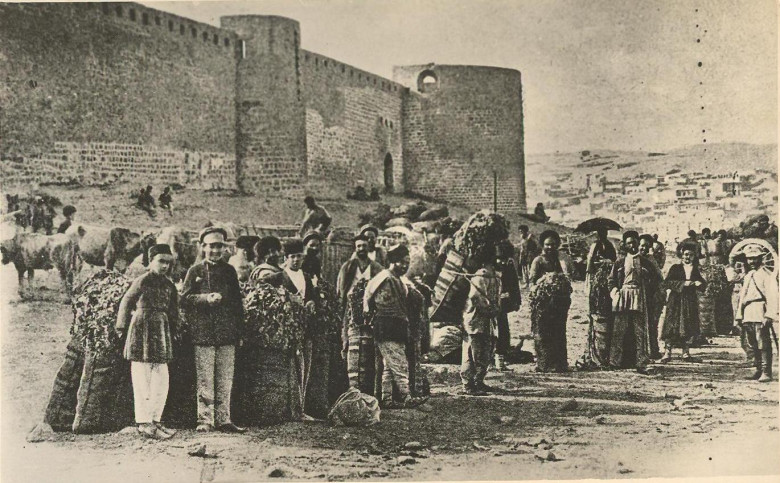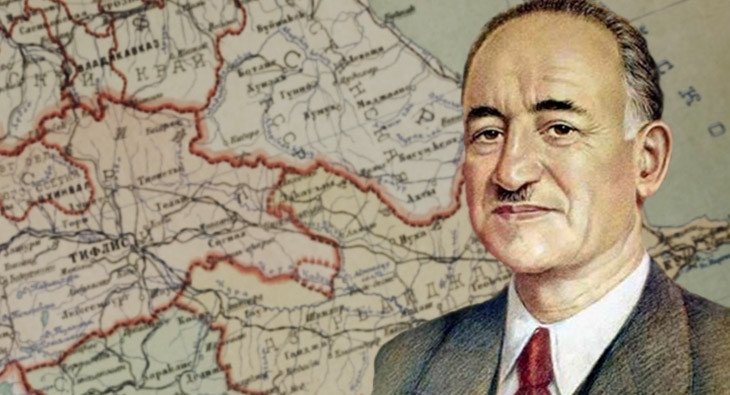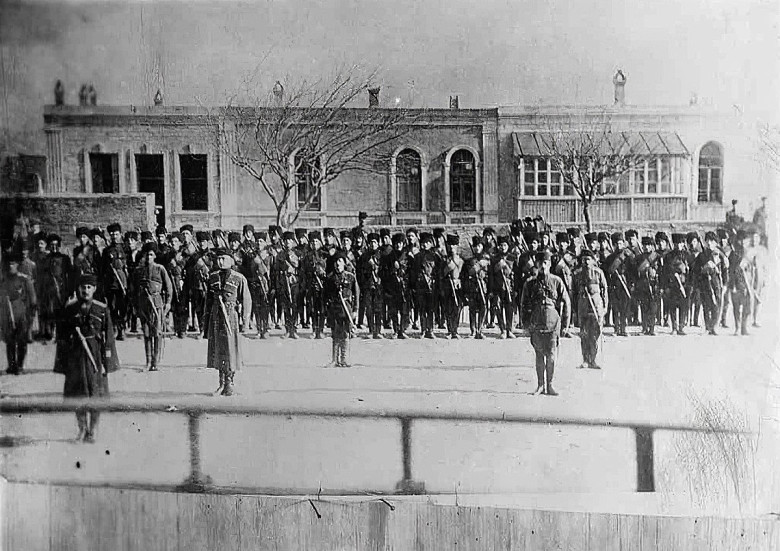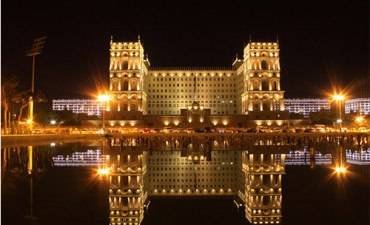28-th May – The Independence Day
28-th May is the Republic Day, a solemnly celebrated state holiday in Azerbaijan. This year marks 103 years since the proclamation of independence of Azerbaijan Democratic Republic by National Council in 1918. People of Azerbaijan welcomes this day with joy and pride every time. The question arises: why is it so important for the people and how did it all happen? This article contains all the answers to the above questions.
Before describing the events when and thanks to whom the Azerbaijan Democratic Republic gained independence, it is necessary to plunge into the past and find yourself among the peaceful population of Azerbaijan, which was driven by the Tsarist Government into a cage of darkness – ignorance.
At the beginning of the XX century, Baku lost its status as a leader in world oil production. All this happened because foreign and Russian entrepreneurs, who were engaged in oil production mainly in the Absheron, Shamakhi and Javad counties, with reckless greed and irrational management of the labor force created an artificial shortage of oil in Azerbaijan. Ordinary workers received meager wages, working in the oil fields from morning to night 12-15 hours a day.
Even more depressing is the fact that Azerbaijani oil workers died or received lifelong injuries after each well drilling. And this was all since entrepreneurs did not bother to use advanced and modern methods and equipment for oil production, as their Western, more reasonable colleagues did.
As is known, Tsarist Russia pursued a resettlement policy: Russian peasants were allocated lands on the territory of Azerbaijan to provide the discontented population with fertile lands at the beginning of the XX century. More than two thousand Azerbaijani families were expelled from their native villages and when trying to return to their father’s house, the displaced Russians, provided with firearms by the government, were waiting for the Azerbaijanis.

There was also a discriminatory policy: Tsarist Russia provided privileges and privileges to Armenian, Russian, and German families forcibly relocated to the territory of Azerbaijan at the beginning of the XIX century. Azerbaijanis and other peoples on its territory who professed Islam, that is, the Muslim population, experienced all the “charms” of national oppression and injustice insulting the honor of every Muslim.
The South Caucasian Christians published their own newspapers, they were given an amazing opportunity to educate the Christian population not only with the help of books, but also magazines. It was also important that large numbers of Christians could freely build churches, conduct sermons in them, thereby firmly entrenching themselves on foreign lands. In parallel with the prosperity of the alien population, the indigenous population was oppressed. Muslims were not allowed to study writing or develop in their native language. They were used as laborers.
But not only tyranny and despotism reigned in Azerbaijan: the growing discontent throughout the Empire slowly, step by step, led directly to its collapse and, subsequently, to the formation of the workers Communist Party.
As it is not difficult to guess, the oppressed situation of indigenous population of Azerbaijan could not but affect its intelligentsia. All this was painfully reflected in the hearts of the virtues and bright minds of Azerbaijan.
It is thanks to such outstanding figures as Hasan-bek Zardabi, Alimardan-bek Topchubashev, Mammad Emin Rasulzade, Uzeyir Hajibeyli, Firudin-bek Kocharly, Mammad Seyid Ordubadi, Jalil Mammadkulizade, Haji Zeynalabdin Tagiyev, Musa Nagiyev, Murtuza Mukhtarov and many others that it was possible to open the eyes of the poor and humiliated people and help in the national movement against the oppression of the Tsarist Government. The Tsarist Government, which took the breath of the Muslim population, did not allow the possibility of enlightenment and education, which at any time was vice and scourge of any society.
The individuals listed above were able to achieve the holding of All-Russian Congresses of Muslims. Crimean and Kazan Muslims also participated in these important events for the people.
Soon national parties and organizations were created aimed at combating the injustice and permissiveness of the Tsarist tyrants towards the peaceful population of the Caucasus. Undoubtedly, all these events and meetings, where prominent figures repeatedly discussed the future of Azerbaijan, had only one bright and great goal: Azerbaijan should become free and independent!
The opportunity to achieve this great mission was not long in coming: it presented itself immediately after the overthrow of the Tsarist Government in Russia, during the February revolution. In the Caucasus, in 1917, a new, provisional government was formed. The subsequent seizure of power by the Bolsheviks, the overthrow of the provisional government and the peace agreements completely changed the whole situation in the Caucasus. It was important for the previously formed Bolsheviks to keep the Caucasus, namely Azerbaijan, which remained under the constant influence of Europe and the West.
On February 23, 1918, the deputies of the Caucasus formed the Transcaucasian Parliament in Tbilisi. The Azerbaijani faction then consisted of 44 people. On April 22 of the same year, the Transcaucasian Democratic Federal Republic was formed with its capital in Tbilisi.

But because of internal disagreements, Georgia left this union and declared its independence. The Azerbaijani faction held a separate meeting on May 27 and also decided to declare its independence, identified itself as the National Council. Mammad Emin Rasulzade, who participated in the negotiations between the Ottomans in Transcaucasia in Batumi, was elected chairman of the National Council of Azerbaijan, and Fatali Khan Khoysky became Prime Minister. The Meeting of National Council adopted The Declaration of Independence Of Azerbaijan On May 28, 1918.
Some provisions from the 1918 Declaration of Independence:
- From now on, the Azerbaijani people are the bearer of sovereign rights and Azerbaijan, covering the Eastern and Southern Transcaucasia, is considered a full-fledged independent state.
- A Democratic Republic shall be established as the form of the political structure of independent Azerbaijan.
- The Azerbaijan Democratic Republic strives to establish good-neighborly relations with all members of the international community, and especially with neighboring peoples and States.
- The Azerbaijan Democratic Republic guarantees within its borders civil and political rights to all citizens without distinction of nationality, religion, social status, and gender.
- The Azerbaijan Democratic Republic will provide a wide scope for free development to all nationalities inhabiting its territory.
- Until the convocation of the Constituent Assembly, the National Council, elected by popular vote, and the Provisional Government, responsible to the National Assembly, are at the head of administration of whole Azerbaijan.
The government was first based in Tbilisi, and then moved to Ganja, and 2 months later to Baku. Six months after its foundation, in November, in Paris, Azerbaijan, Georgia and Armenia signed a Peace Memorandum on the correctness of the territorial division between the peoples of South Caucasus. It was then that the map of Azerbaijan took on the appearance corresponding to the current situation of the country.

The Azerbaijan Democratic Republic became the first parliamentary republic and handed over the rights to women throughout the East. The law on the formation of Azerbaijan Parliament was adopted on November 19, 1918. The National Council, which consisted of 44 Azerbaijanis, stopped its work back in Ganja on June 17, 1918 and resumed its activities under the chairmanship of Mammad Emin Rasulzade.
The National Council decided to form a parliament of 120 people: 80 Azerbaijanis and 40 representatives of other minorities according to their percentage in the country. The last meeting of the Parliament was held on April 27, 1920, right before the collapse of the Republic, which existed for 23 months. During the entire period of its existence, the Parliament held 155 meetings, more than 270 bills were discussed, 230 of which were adopted.
That independent Azerbaijan was not recognized by many states for the present time: only 16 countries recognized the independence of Azerbaijan, including such neighboring countries as Iran, Armenia, Turkey and Georgia, as well as such major powers as Italy, France, the United States and Switzerland. This list did not include Bolshevik Russia, which still believed that the battle for the Caucasus was not lost: and it was not mistaken…
Tags: May 28, Azerbaijan Democratic Republic, Alimardan bey Topchubashev, Haji Zeynalabdin Tagiyev, Hasan bey Zardabi, Republic Day, Jalil Mammadkulizade, Mamed Seyid Ordubadi, Mamed Emin Rasulzade, Murtuza Mukhtarov, Musa Nagiyev, Uzeyir Hajibeyli, Firudin bey Kocharli
Tags:28 Мая, Муртуза Мухтаров, Муса Нагиев
Tags: Baku , Azerbaijan , 28-th May , Republic Day , National council , Muslims , Christians , Tsarist Govermant , Murtuza Mukhtarov , Musa Nagiyev
Recent Posts

Buy any tour and get 15 percent discount in Baku restaurants

Festivals In Azerbaijan

Great Silk Road In Azerbaijan

Guide to outdoor activities







